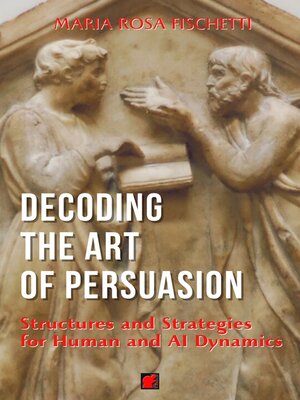Decoding the Art of Persuasion
ebook ∣ Structures and Strategies for Human and AI Dynamics
By Maria Rosa Fischetti

Sign up to save your library
With an OverDrive account, you can save your favorite libraries for at-a-glance information about availability. Find out more about OverDrive accounts.
Find this title in Libby, the library reading app by OverDrive.



Search for a digital library with this title
Title found at these libraries:
| Library Name | Distance |
|---|---|
| Loading... |
The art of persuasion is a discipline that has spanned centuries, shaping thought and social interactions. From the passionate speeches of antiquity to modern advertising and political campaigns, argumentative reasoning has proven to be an essential tool for influencing decisions, building consensus, and guiding opinions.
Today, however, the advent of artificial intelligence marks a radical shift: AI systems no longer merely imitate human communication, but they are capable of learning, adapting, and personalizing messages in real-time, revolutionizing how persuasion is conceived and applied. This transformation raises new questions, both technical and ethical: what are the implications of language designed to persuade?
This book offers a detailed analysis of the structures and strategies of argumentation. The principles of classical logic and rhetoric are explored, followed by modern approaches such as the pragmatics of argumentation and computational models applied to persuasion. Special attention is given to the tools that characterize persuasive interactions in intelligent systems.
An interdisciplinary work that blends philosophy and linguistics, designed for scholars, professionals, and enthusiasts eager to understand and master the dynamics of persuasion in an era of continuous innovation and complex communication.
Today, however, the advent of artificial intelligence marks a radical shift: AI systems no longer merely imitate human communication, but they are capable of learning, adapting, and personalizing messages in real-time, revolutionizing how persuasion is conceived and applied. This transformation raises new questions, both technical and ethical: what are the implications of language designed to persuade?
This book offers a detailed analysis of the structures and strategies of argumentation. The principles of classical logic and rhetoric are explored, followed by modern approaches such as the pragmatics of argumentation and computational models applied to persuasion. Special attention is given to the tools that characterize persuasive interactions in intelligent systems.
An interdisciplinary work that blends philosophy and linguistics, designed for scholars, professionals, and enthusiasts eager to understand and master the dynamics of persuasion in an era of continuous innovation and complex communication.







